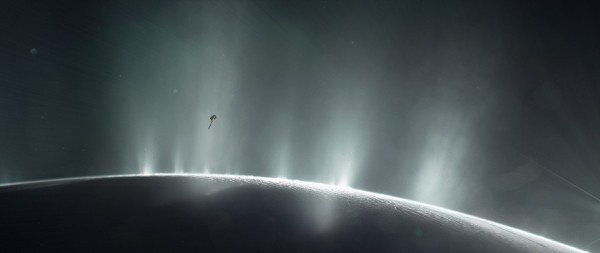By Ana Verayo, | April 14, 2017

This illustration shows Cassini diving through the Enceladus plume in 2015. (NASA/JPL-Caltech)
NASA has announced that alien life might exist on one of Saturn's moons, Enceladus. Scientists have suggested in past studies that Enceladus might host life since a subsurface ocean covers the entire moon. Apart from this, new research has also revealed the presence of chemical energy that can breed microbial life.
Like Us on Facebook
Enceladus is covered with an icy shell, but the ocean underneath its surface ejects plumes of water, similar to geysers here on Earth. In this new study, NASA mission scientists have obtained the best evidence yet of potential life on this otherwise icy moon, based on data collected by NASA Saturn spacecraft Cassini which is currently orbiting the ringed planet.
Cassini's new findings revealed that a huge plume of water was being emitted from the surface of Enceladus and the spacecraft was able to take measurements and readings, beaming this precious data back to Earth.
Furthermore, Cassini mission scientists were able to detect molecular hydrogen from those water vapor jets from Saturn's moon. This was apparently caused by hydrothermal activity that is generated by hot rocks and water within the icy crust of Enceladus.
This hydrothermal activity is also present on Earth in hydrothermal vents in the deepest parts of the oceans, formed by volcanism. Ancient life forms on Earth including many organisms today feed on this hydrogen and in turn produce methane, which is also highly likely in Enceladus since this hydrogen detection.
This crucial emission is generated by "methanogenesis" where molecular hydrogen and carbon dioxide reacts with each other, producing food for micro organisms in deep, undersea environments on Earth.
For life to exist on other planets, there should be water, organic molecules, and a heat source. Water and organic molecules have already been detected on Enceladus, and now, a source of energy is generating food or fuel as a primary source, that can sustain microbial life.
According to astrobiologist Lewis Dartnell from the University of Westminster, this discovery on Enceladus means that there is a warm and wet environment under this moon and a very important fuel or energy source for ecosystems to thrive in.
Further studies will determine and confirm this alien ecosystem in Enceladus, but the key finding here is there is a direct observation of this energetic process that is capable of fueling alien life.
-
Use of Coronavirus Pandemic Drones Raises Privacy Concerns: Drones Spread Fear, Local Officials Say

-
Coronavirus Hampers The Delivery Of Lockheed Martin F-35 Stealth Fighters For 2020

-
Instagram Speeds Up Plans to Add Account Memorialization Feature Due to COVID-19 Deaths

-
NASA: Perseverance Plans to Bring 'Mars Rock' to Earth in 2031

-
600 Dead And 3,000 In The Hospital as Iranians Believed Drinking High-Concentrations of Alcohol Can Cure The Coronavirus

-
600 Dead And 3,000 In The Hospital as Iranians Believed Drinking High-Concentrations of Alcohol Can Cure The Coronavirus

-
COVID-19: Doctors, Nurses Use Virtual Reality to Learn New Skills in Treating Coronavirus Patients







